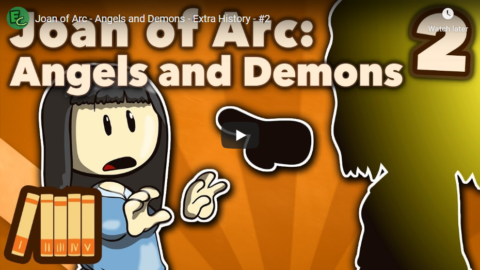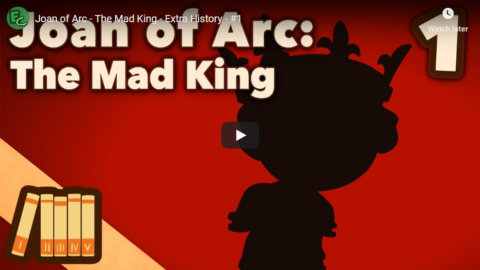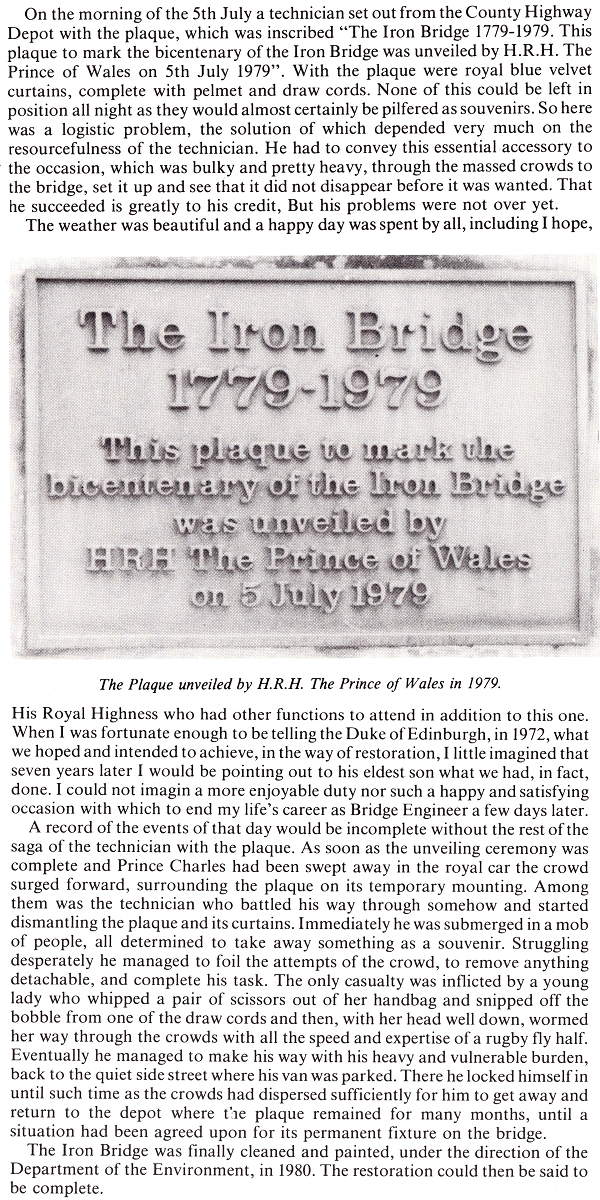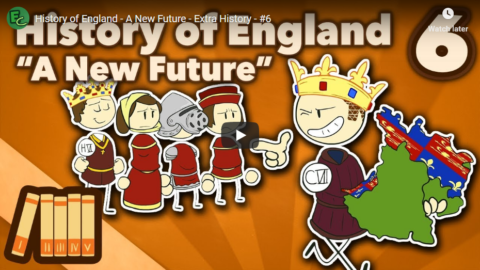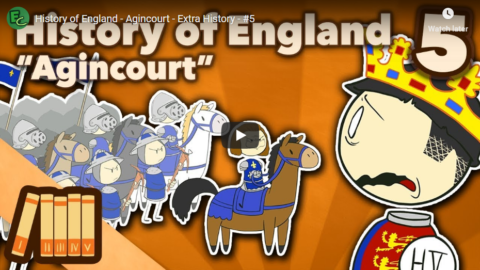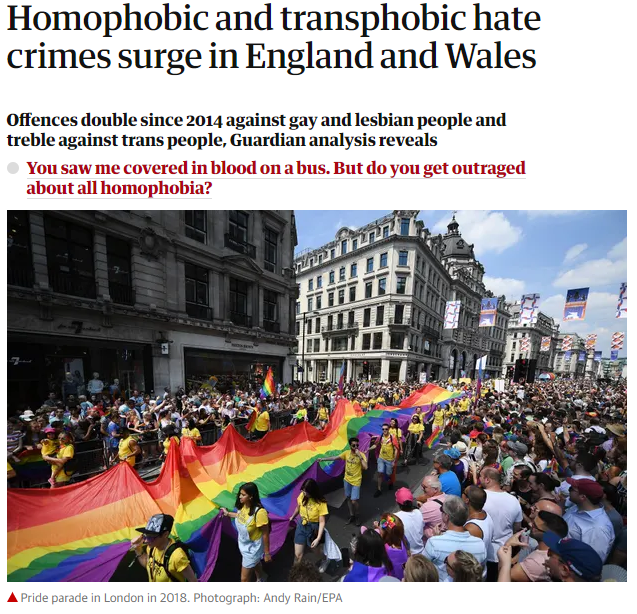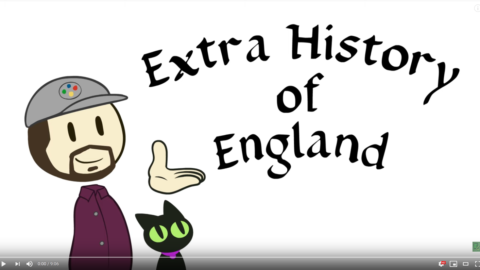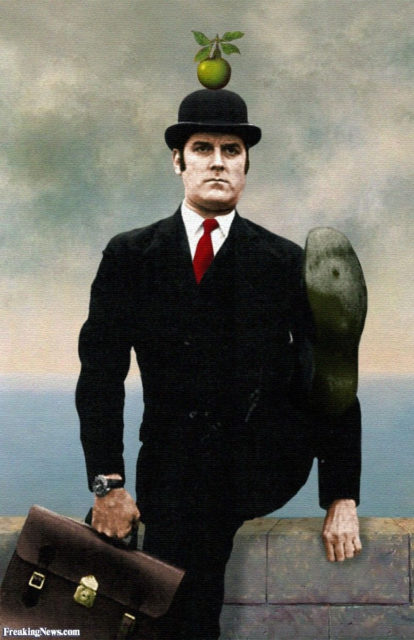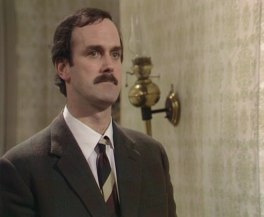Extra Credits
Published on 13 Jul 2019Joan of Arc was on a mission from God — a mission to guide the Armagnacs into a holy war.
Follow us on Instagram: http://bit.ly/ECisonInstagramJoin us on Patreon! http://bit.ly/EHPatreon
July 14, 2019
Joan of Arc – Angels and Demons – Extra History – #2
July 11, 2019
QotD: English is weird
English started out as, essentially, a kind of German. Old English is so unlike the modern version that it feels like a stretch to think of them as the same language at all. Hwæt, we gardena in geardagum þeodcyninga þrym gefrunon – does that really mean “So, we Spear-Danes have heard of the tribe-kings’ glory in days of yore”? Icelanders can still read similar stories written in the Old Norse ancestor of their language 1,000 years ago, and yet, to the untrained eye, Beowulf might as well be in Turkish.
The first thing that got us from there to here was the fact that, when the Angles, Saxons and Jutes (and also Frisians) brought their language to England, the island was already inhabited by people who spoke very different tongues. Their languages were Celtic ones, today represented by Welsh, Irish and Breton across the Channel in France. The Celts were subjugated but survived, and since there were only about 250,000 Germanic invaders – roughly the population of a modest burg such as Jersey City – very quickly most of the people speaking Old English were Celts.
Crucially, their languages were quite unlike English. For one thing, the verb came first (came first the verb). But also, they had an odd construction with the verb do: they used it to form a question, to make a sentence negative, and even just as a kind of seasoning before any verb. Do you walk? I do not walk. I do walk. That looks familiar now because the Celts started doing it in their rendition of English. But before that, such sentences would have seemed bizarre to an English speaker – as they would today in just about any language other than our own and the surviving Celtic ones. Notice how even to dwell upon this queer usage of do is to realise something odd in oneself, like being made aware that there is always a tongue in your mouth.
John McWhorter, “English is not normal”, Aion, 2015-11-13.
July 7, 2019
Joan of Arc – The Mad King – Extra History – #1
Extra Credits
Published on 6 Jul 2019Before we can really get into Joan of Arc’s life, we have to get a bit into the civil war between the Burgundians and the Armagnacs. Time for some royal family drama with King Charles VI’s madness and Queen Isabeau’s friend Louis.
Follow us on Instagram: http://bit.ly/ECisonInstagram
Join us on Patreon! http://bit.ly/EHPatreon
July 6, 2019
The Iron Bridge in Shropshire
Roger Henry sent along this information on the most recent restoration of the world’s oldest iron bridge near Coalbrookdale:
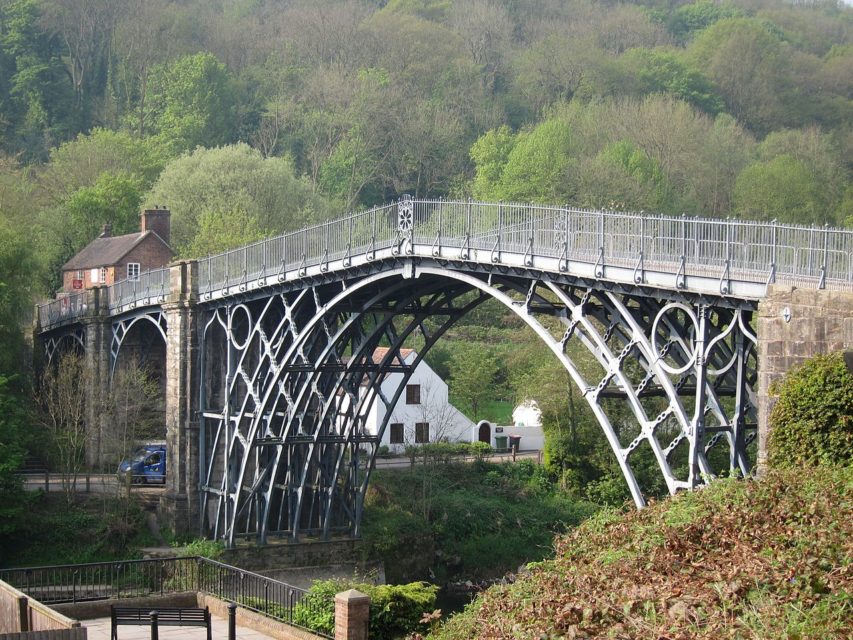
The Iron Bridge across the River Severn, completed in 1779. The first major bridge to be made of iron.
Photo by shirokazan via Wikimedia Commons.
Wikipedia says:
The Iron Bridge is a bridge that crosses the River Severn in Shropshire, England. Opened in 1781, it was the first major bridge in the world to be made of cast iron, and was greatly celebrated after construction owing to its use of the new material.
In 1934 it was designated a Scheduled Ancient Monument and closed to vehicular traffic. Tolls for pedestrians were collected until 1950, when ownership of the bridge was transferred to Shropshire County Council. It now belongs to Telford and Wrekin Borough Council. The bridge, the adjacent settlement of Ironbridge and the Ironbridge Gorge form the UNESCO Ironbridge Gorge World Heritage Site. The bridge is a Grade I listed building, and a waypoint on the South Telford Heritage Trail.
Anthony Blackwall, who was the Shropshire County Bridgemaster, recounts the 1979 celebrations in “Historic Bridges of Shropshire”, Shropshire Libraries, 1985:
The most recent restoration was completed late in 2018:
The bridge, the first of its kind, was closed for a year after surveyors found cracks and stresses in its historic cast ironwork.
English Heritage launched a £3.6 million programme of repairs in autumn of 2017.
Kate Mavor, the charity’s CEO, came to the gorge to get a first-hand look at the historic bridge restored, and spoke of her pride.
“This is the first English Heritage site I remember coming to when I was about 11, and now it looks much the same as it did then.
“This is the first time I’ve seen it refurbished and I think it sits very nicely in the gorge, and with the red paint it will especially look good in autumn colours.
“I’ve been following the repairs closely since they began, it is an extraordinary project.
“The gorge is a world heritage site, the bridge was the first of its kind and it’s been there since 1779.
“It has survived a number of pernicious influences including an earthquake.
“We’re very proud of what we’ve been able to do here because it’s been unlike any other project of ours.
“We’re very grateful to everyone that has supported the project.
“The amazing response we had to English Heritage’s first ever crowdfunding campaign was fantastic too.”
Kate said that the surveys carried out before the project started revealed that the bridge had originally been painted a deep red, unlike the recognisable black or grey layer of recent years.
July 1, 2019
History of England – A New Future – Extra History – #6
Extra Credits
Published on 29 Jun 2019The 116-year struggle helped define and unite the English. In France, the wars forced the kings to tackle the separatist forces, and France would become the undisputed arbiter of Europe.
Thanks again to David Crowther for writing AND narrating this series! https://thehistoryofengland.co.uk/pod…
Join us on Patreon! http://bit.ly/EHPatreon
June 24, 2019
History of England – Agincourt – Extra History – #5
Extra Credits
Published on 22 Jun 2019Henry V was formidable and ruthless. Leading an army struck by dysentery, he pressed on to claim more large swaths of France, forming the irresistible Anglo Burgundian alliance.
Henry V is a serious contender for the most impressive man ever to rule England. On his death, a chronicler wrote: “He did not leave his like upon earth among Christian kings or princes.” His only fault was to die young… well, that, and being so horrifically ruthless and cold, that another historian wrote of Henry that he was “conclusive proof that a man may be a hero and yet a monster.”
Thanks again to David Crowther for writing AND narrating this series! https://thehistoryofengland.co.uk/pod…
Join us on Patreon! http://bit.ly/EHPatreon
June 21, 2019
Lies, damned lies, and hate crime statistics
Fraser Myers explains why the much-remarked-upon British crime statistics showing huge increases in hate crimes are much more a statistical artifact than a true reflection of the state of British society:
Allegedly, England and Wales are in the grip of a “surge” in homophobic and transphobic hate crime. “The rate of LGBT hate crime per capita rose by 144 per cent between 2013-14 and 2017-18”, it reports. Hate-crime hotspots like South Yorkshire and Hampshire experienced even larger surges, it claims, with police-recorded crimes rising by 376 per cent and 189 per cent in the same period, respectively.
To make matters worse, according to LBGT campaigners, this rise in hate crime doesn’t even capture the true extent of the hatred out there. Taz Edwards-White, alliance manager at equalities and diversity organisation Metro, told the Guardian that the hate-crime figures were likely to be “the tip of the iceberg”. She and other campaigners say this rise could be down to the rise of right-wing populism.
The truth is rather different. Every year for the past five years, the release of police-recorded data on hate crime has been accompanied by panicked media reports of a hate-crime surge. But as last year’s Home Office report made abundantly clear, large increases “are due to the improvements made by the police in their identification and recording of hate-crime offences and more people coming forward to report these crimes rather than a genuine increase” (emphasis mine).
What’s more, there is a good reason why the “surge” identified by the Guardian takes off in 2013-2014. 2014 was the year the College of Policing released its Hate Crime Operational Guidance [PDF], which is still used to this day. This guidance actually demands that the numbers increase. “Targets that see success as reducing hate crime are not appropriate”, it says. As part of the drive to record more crime, there has been a slew of public-information campaigns and regular exhortations from police for the public to report hateful incidents, particularly in the wake of major political events like the EU referendum and the 2017 terror attacks.
Police-recorded data has other problems, too. Police are obliged to record not only criminal actions but also all non-crime hate incidents. A non-crime hate incident is literally any event that is perceived by the victim or any other person to be motivated by hostility towards a so-called protected characteristic. The key word here is perceived. As the Operational Guidance makes clear: “The victim does not have to justify or provide evidence of their belief, and police officers or staff should not directly challenge this perception. Evidence of the hostility is not required for an incident or crime to be recorded as a hate crime or hate incidents.”
June 16, 2019
History of England – Ashes – Extra History – #4
Extra Credits
Published on 15 Jun 2019Bertrand du Guesclin was the hero the French needed. Focused on fortifying defenses and cities, Guesclin rebutted the advances of the Black Prince — who ended up contracting an illness that undid his iconic image of triumph and chivalry. Edward became beset by drama in the royal court, and England started to lose power…
Thanks again to David Crowther for writing AND narrating this series! https://thehistoryofengland.co.uk/pod…
Join us on Patreon! http://bit.ly/EHPatreon
June 11, 2019
June 2, 2019
History of England – Fire and Swords – Extra History – #2
Extra Credits
Published on 1 Jun 2019On the 26th of August,1346, Philip’s army drew near the English force. The French were strung out for miles. Phillip’s best commanders advised caution: put on those comfy jim-jams the Queen gave you last Christmas, don the royal slippers, get a goodnight’s snooze, and let everyone catch up, then drown the English in a river of their own blood after a light breakfast. But Phillip looked upon the current puny size of the English army, and ordered the attack anyway…
Thanks again to David Crowther for writing AND narrating this series! https://thehistoryofengland.co.uk/pod…
Join us on Patreon! http://bit.ly/EHPatreon
Experiment 2 for social media thumbnails:
May 31, 2019
Basil Fawlty’s “John Cleese” moment
Renowned English comedian Basil Fawlty had a thinko the other day when he (accidentally?) tweeted in the character of noted racist, sexist, white supremacist, homophobe, transphobe, neo-Nazi, etc., etc., “John Cleese”:
Some years ago I opined that London was not really an English city any more
Since then, virtually all my friends from abroad have confirmed my observation
So there must be some truth in it…
I note also that London was the UK city that voted most strongly to remain in the EU
— John Cleese (@JohnCleese) May 29, 2019
Arthur Chrenkoff somehow mistakes the actor for his character (because no real life person like “John Cleese” could possibly exist in post-Cool Brittania, could they?).
As you can imagine, this sentiment didn’t go down very well. The mayor of London, Saddiq Khan, tweeted back “These comments make John Cleese sound like he’s in character as Basil Fawlty. Londoners know that our diversity is our greatest strength. We are proudly the English capital, a European city and a global hub.” Don’t mention the culture war, I guess. Needless to say, various other worthies have joined in to chide Cleese, including questioning what is Englishness anyway?
That’s a good question. Cleese no doubt had in mind the ethnic English, or people who come from the Anglo-Saxon or at least the Anglo-Celtic stock and heritage, who for the great majority of the past millennium and more have constituted the great, if not the overwhelming, majority of the inhabitants of England, and who, again over the course of centuries, have created what we know and understand as the English culture, tradition and institutions. Yes, there have always been migrants arriving and contributing to the mix – Normans, French Huguenots, Jews – but they have been relatively small in number and by and large ethnically and culturally similar. But Cleese’s definition is increasingly at odds with the post-nation state view of belonging. As TV presenter Anila Chowdhry replied to the Monty Python alumnus, “John Cleese, your comment is not only ironic as you live in the Caribbean, but it fails to recognise the benefits of multiculturalism AND that people of different colour in London may actually be English too! I was born & bred in England. I’m brown, English & proud. #ThisIsMyHome”, which of course can be true too, if anything as a legal and cultural matter. This is also coincidentally while it is easier to “become” an American or an Australian or another -an of one of the historically migrant countries where the “-anness” is built on shared civic ideas rather than ethnicity.
(For the record, over 40 per cent of London residents have been born overseas, which is one of the highest proportions in the world, and if you consider major cities, over one million in population, only Toronto, Sydney and Melbourne have more first-generation migrants. Whatever you think, and whatever you think of it, the London of today is certainly not the London of Cleese’s childhood or even his middle age.)
May 26, 2019
History of England – The 100 Years War – Extra History – #1
Extra Credits
Published on 25 May 2019At stake on the English side was trade, the English role in Christendom, the king’s lands in France held by right for 150 years, and the reputation and honor of the king. On the French side, a unified country, national prestige, and the right of their monarch to his own throne.
Thanks again to David Crowther for writing AND narrating this series! https://thehistoryofengland.co.uk/pod…
Join us on Patreon! http://bit.ly/EHPatreon
May 21, 2019
Four “youths” vandalize model railway show
There don’t appear to be any details online about the four “youths” who were arrested then released, so I assume their anonymity is protected by a British equivalent of the “Young Offenders Act”. The Market Deeping Model Railway Club describes the crime on their website:
We were all immensely upset to discover that overnight the school where our show was to be held had been broken into and almost everything totally ruined. This has devastated not only our own members but those of other clubs and the traders who had already set up shop. In the circumstances we felt we had no option other than to cancel the show.
Some of the models destroyed were irreplaceable and while we will of course be seeking to replace and rebuild wherever possible, this will take time and money. We have been overwhelmed by the many messages of support we have received together with offers of financial assistance. Please do help raise funds via our Just Giving page.
More on the incident from Deepings Nub News:
Bill Sowerby, Market Deeping Model Railway Club exhibition manager, told Deepings Nub News: “I arrived at 7.30am to be met by one of our members who told me the terrible news.
“Four of the layouts were completely trashed – two of our club’s, one privately owned and one from St Neots club.
“Four demonstrator stands and one for Bourne U3A stall, which would have raised funds for their organisation, was also smashed.
“Fortunately five other layouts in another room were undamaged and we had nine more left to install early this morning.
“It’s really hurtful for us all, not just because of the thousands of pounds we have lost in income – we were expecting between 400 and 500 visitors – and have paid out a lot of money to put on what is the club’s main fundraising event. Demonstrators and trade stands have also lost income.
“But it’s also the time and effort that members put into building the layouts. The St Neots layout took 25 years to construct and our Woodcroft layout took 26 years and involved more than 100 people over those years spending thousands of hours.
“Woodcroft will be repaired, but it’s so sad because a large number of the people who dedicated their time to build it are no longer with us. It has real sentimental importance to the club.
“Although our Knowl End – a children’s layout – was completely destroyed.”
May 20, 2019
A Guide to Dark Age British Politics
History With Hilbert
Published on 26 Sep 2017A beginner’s guide to the politics of Dark Age Britain, from the southern Celts to the Anglo-Saxon kingdoms and the Pictish north.

